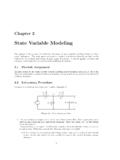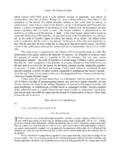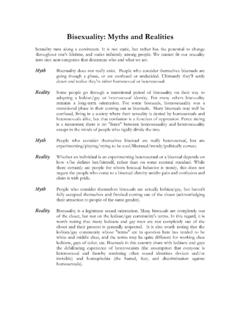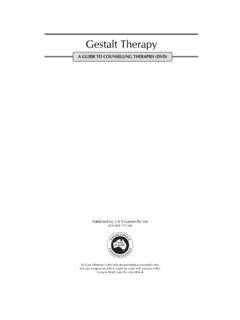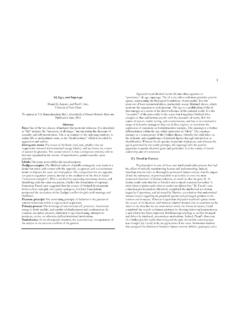Transcription of MANIFESTO OF SURREALISM
1 MANIFESTO OF SURREALISM BY ANDR BRETON (1924) So strong is the belief in life, in what is most fragile in life real life, I mean that in the end this belief is lost. Man, that inveterate dreamer, daily more discontent with his destiny, has trouble assessing the objects he has been led to use, objects that his nonchalance has brought his way, or that he has earned through his own efforts, almost always through his own efforts, for he has agreed to work, at least he has not refused to try his luck (or what he calls his luck!). At this point he feels extremely modest: he knows what women he has had, what silly affairs he has been involved in; he is unimpressed by his wealth or his poverty, in this respect he is still a newborn babe and, as for the approval of his conscience, I confess that he does very nicely without it.
2 If he still retains a certain lucidity, all he can do is turn back toward his childhood which, however his guides and mentors may have botched it, still strikes him as somehow charming. There, the absence of any known restrictions allows him the perspective of several lives lived at once; this illusion becomes firmly rooted within him; now he is only interested in the fleeting, the extreme facility of everything. Children set off each day without a worry in the world. Everything is near at hand, the worst material conditions are fine. The woods are white or black, one will never sleep. But it is true that we would not dare venture so far, it is not merely a question of distance.
3 Threat is piled upon threat, one yields, abandons a portion of the terrain to be conquered. This imagination which knows no bounds is henceforth allowed to be exercised only in strict accordance with the laws of an arbitrary utility; it is incapable of assuming this inferior role for very long and, in the vicinity of the twentieth year, generally prefers to abandon man to his lusterless fate. Though he may later try to pull himself together on occasion, having felt that he is losing by slow degrees all reason for living, incapable as he has become of being able to rise to some exceptional situation such as love, he will hardly succeed.
4 This is because he henceforth belongs body and soul to an imperative practical necessity which demands his constant attention. None of his gestures will be expansive, none of his ideas generous or far-reaching. In his mind s eye, events real or imagined will be seen only as they relate to a welter of similar events, events in which he has not participated, abortive events. What am I saying: he will judge them in relationship to one of these events whose consequences are more reassuring than the others. On no account will he view them as his salvation. Beloved imagination, what I most like in you is your unsparing quality. There remains madness, "the madness that one locks up," as it has aptly been described.
5 That madness or We all know, in fact, that the insane owe their incarceration to a tiny number of legally reprehensible acts and that, were it not for these acts their freedom (or what we see as their freedom) would not be threatened. I am willing to admit that they are, to some degree, victims of their imagination, in that it induces them not to pay attention to certain rules outside of which the species feels threatened which we are all supposed to know and respect. But their profound indifference to the way in which we judge them, and even to the various punishments meted out to them, allows us to suppose that they derive a great deal of comfort and consolation from their imagination, that they enjoy their madness sufficiently to endure the thought that its validity does not extend beyond themselves.
6 And, indeed, hallucinations, illusions, etc., are not a source of trifling pleasure. [..] The case against the realistic attitude demands to be examined, following the case against the materialistic attitude. The latter, more poetic in fact than the former, admittedly implies on the part of man a kind of monstrous pride which, admittedly, is monstrous, but not a new and more complete decay. It should above all be viewed as a welcome reaction against certain ridiculous tendencies of spiritualism. Finally, it is not incompatible with a certain nobility of thought. By contrast, the realistic attitude, inspired by positivism, from Saint Thomas Aquinas to Anatole France, clearly seems to me to be hostile to any intellectual or moral advancement.
7 I loathe it, for it is made up of mediocrity, hate, and dull conceit. It is this attitude which today gives birth to these ridiculous books, these insulting plays. It constantly feeds on and derives strength from the newspapers and stultifies both science and art by assiduously flattering the lowest of tastes; clarity bordering on stupidity, a dog s life. The activity of the best minds feels the effects of it; the law of the lowest common denominator finally prevails upon them as it does upon the others. [..] We are still living under the reign of logic: this, of course, is what I have been driving at. But in this day and age logical methods are applicable only to solving problems of secondary interest.
8 The absolute rationalism that is still in vogue allows us to consider only facts relating directly to our experience. Logical ends, on the contrary, escape us. It is pointless to add that experience itself has found itself increasingly circumscribed. It paces back and forth in a cage from which it is more and more difficult to make it emerge. It too leans for support on what is most immediately expedient, and it is protected by the sentinels of common sense. Under the pretense of civilization and progress, we have managed to banish from the mind everything that may rightly or wrongly be termed superstition, or fancy; forbidden is any kind of search for truth which is not in conformance with accepted practices.
9 It was, apparently, by pure chance that a part of our mental world which we pretended not to be concerned with any longer -- and, in my opinion by far the most important part -- has been brought back to light. For this we must give thanks to the discoveries of Sigmund Freud. On the basis of these discoveries a current of opinion is finally forming by means of which the human explorer will be able to carry his investigation much further, authorized as he will henceforth be not to confine himself solely to the most summary realities . The imagination is perhaps on the point of reasserting itself, of reclaiming its rights. If the depths of our mind contain within it strange forces capable of augmenting those on the surface, or of waging a victorious battle against them, there is every reason to seize them -- first to seize them, then, if need be, to submit them to the control of our reason.
10 The analysts themselves have everything to gain by it. But it is worth noting that no means has been designated a priori for carrying out this undertaking, that until further notice it can be construed to be the province of poets as well as scholars, and that its success is not dependent upon the more or less capricious paths that will be followed. Freud very rightly brought his critical faculties to bear upon the dream. It is, in fact, inadmissible that this considerable portion of psychic activity (since, at least from man's birth until his death, thought offers no solution of continuity, the sum of the moments of the dream, from the point of view of time, and taking into consideration only the time of pure dreaming, that is the dreams of sleep, is not inferior to the sum of the moments of reality, or, to be more precisely limiting, the moments of waking) has still today been so grossly neglected.
